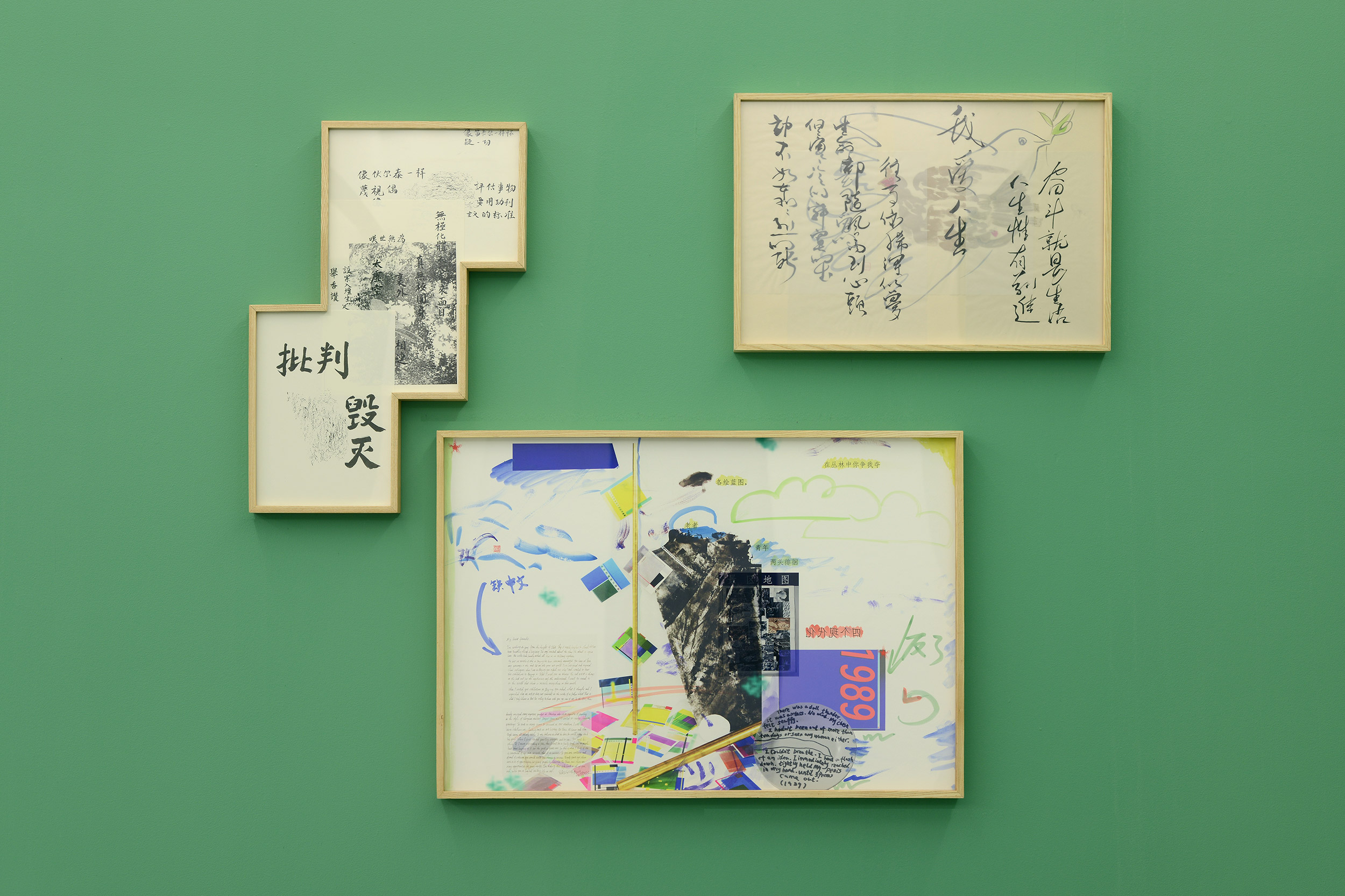Liu Ding & Han Dong: Let’s Say Goodbye!
This post is also available in:
 简体中文 (Chinese (Simplified))
简体中文 (Chinese (Simplified))  English
English
This is another attempt to practice self-awareness and self-understanding. The exhibition is guided by a twenty-year friendship between two people. Having known one another for a long time, this marks the first time fragments from the trajectory of their practices share the same space under an exhibition context. That is not to say there is necessarily any direct connection that converges their works together. Throughout the years, they have never lived in the same city, nor have they worked within the same field – they often rarely intersect. In fact, there has been extended periods of time where there hasn’t been any contact at all.
It wasn’t until in recent years that they resumed seeing one another occasionally again. The once twenty-something youngster is quickly approaching his 40s; and the youthful man back then is approaching well into middle age now. Liu Ding met Han Dong when he first started as an artist. From there, he came into contact and quickly became acquainted with figures from the literary world. It was initially through poetry and writing that he began to look at methods of perceiving and describing the world, seeking ways to articulate this approach within the sphere of art. Invited by the 2015 Istanbul Biennial, Liu Ding produced 31 poems, which was both a method of contemplating and recording the political reality he was facing. Of course, Liu Ding does not consider himself as either poet or writer, but the attentive audience might observe the role text frequently functions, concealed or incorporated through various guises, within his work at different stages of his artistic career.
After all these years, Liu Ding frequently mentions the meetings at Han Dong’s studio in the evening and of the settings where they would eat together with other companions. They often congregated at the Daoxiang restaurant on Huangpu Road. In the late 90s, Han Dong presided over the influential literary journal Lotus (Furong) and invited Liu Ding to chair a column on contemporary art for a year. Han Dong’s desire and perceptiveness to examine and dissect a practice borders on the obsessive. For him, writing requires qualities of self-restraint and discipline – a conviction that has naturally left a profound impression on Liu Ding’s own practice. We cannot say for sure whether Liu Ding’s natural inclination to literature has origins from his father – a man who had once set out to become a writer in his youth, but who eventually entered into medical practice due to some unfortunate circumstances. Yet since Liu Ding embarked on his artistic career through to his adulthood, Han Dong has become a role model, a mirror, a rare confidante, and someone to share an ongoing dialogue with. They have together all kinds of secrets related to their artistic practice, but they take equal pleasure in revealing the methods and clues towards deciphering their codes as they see them.
In 2013, Han Dong published his third collection of poems ‘Born Again’. The publication concentrated on a selection of poetry written in the period from 2002 to 2011. During these ten years, Han Dong experienced an unforeseen number of personal ups and downs in his life. The poems are composed of people and events related exclusively to him: Dear Mother, The Last Few Years, For Cao Xu, Round Jade, May, We Sat On The Street, A Calmness, A Brown Sofa, Have A Toast, Self-Awareness, The Alley, Snowfall, Some People Don’t Like To Talk, Anger, Always Finding Something To Do, Friendship Hotel, Green Tree, Red Fruit, The Chicken Seller, The Vegetable Market, A Tomb Sweeping Outing, Tall Tree In The Small Alley, Night Stroll To A Villa, Elevator Door, Etc., Dark Sun – the titles have a succinct and almost austere quality to them, they directly address people, while also avoiding unnecessary flourishes of language – the attempts to elevate their status with quotation marks at this point seem almost redundant.
These few years, a friend passed away
Yet it feels like he is still alive
A friend stepped into immortality
So it’s bye bye. Let’s say goodbye
I’m still Han Dong, also known as Lao Han
Lao Han is healthy, hiking every week
Not looking ahead from the top, no more outdoor liaisons
So from halfway up, heading down the hill.
– ‘Born Again’, Han Dong, 2010
Han Dong’s poetry often emits a feeling of resolute resilience, ready to be confronted with any desperate circumstance, or to say goodbye at any moment. Yet it also fundamentally avoids an excessive reaction, and is essentially a more clear-headed sense of self-awareness.
In 2013, Liu Ding was invited to present an artist talk at the Tanks in Tate Modern, London, to introduce his practice to an audience. With this particular lecture, Liu Ding created an alias to initiate a ‘weak performance’ – a method of performance developed for the work I Simply Appear in the Company… It marked the first time Liu Ding created a state of presence by employing a form of absence within the setting of a performance. It was explained to the audience that the artist was unable to arrive at the lecture. In this scenario Liu Ding played the role of ‘Mr. Liu’, who performed as a stand-in as a ‘good friend’ for the missing artist. Mr. Liu subsequently entered into a discussion with the event’s curator – a dialogue that was subjected to further stages of manipulation through the act of its translation. It was precisely here that the initiation of the conversation and its commentary became foregrounded as the content of the work itself. Through the enactment of the other, a distance was constructed between the individual and the self, allowing for a complex process of self-examination to unfold. Embedded within the work was a compelling desire for the artist to escape oneself.
In 1998, Han Dong, his friend Zhu Wen, and alongside other independent writers, launched a literary movement titled Rupture (Duanlie), to articulate a decisively different voice in order to draw the line between themselves and the institutionalized literary practice – a system with a tendency to monopolize distribution and criticism. This uninhibited spirit of independence was contagious and wide-ranging. Han Dong’s age at the time now matches Liu Ding’s age today. It is perhaps inevitable for Liu Ding to identify with the many concerns shared by this scene initiated by Han Dong, especially moments of rupture within the system and of the proclamations exhorted throughout these events. What is particularly relevant is how Han Dong broke away from the pressures wrought onto him by reality, but also how as an individual, he had developed in relation to the fissures and friction caused by the encounters with his surroundings. It is difficult for Liu Ding not to be inspired by the enduring ‘age-old scorn’, which can be found resolutely within the verses of Han Dong’s poetry – a feeling emblematic of the alienation and efforts of our era, but also of the relationship between society, industry, an artist’s practice, and the individual.
Passing a place innumerable times
This place has become smaller
Walls of the street have become walls of a house
Trees look like giant bonsais
The first time was an anomaly
Having witnessed life’s flood
Its memory fades and dissipates
Like a scrap of paper floating about
So you should go around the world
Before the scenery becomes old-fashioned
So you should leave promptly
And learn how to be born again.
– ‘Born Again’, Han Dong, 2010










